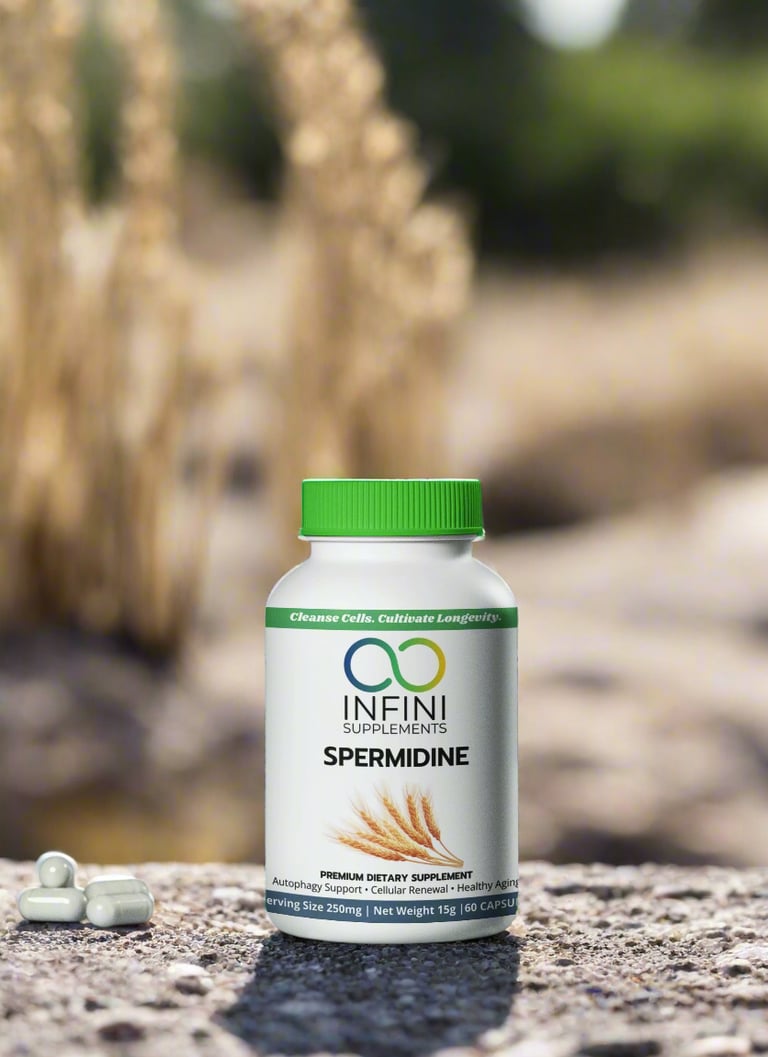Spermidine: Unlocking Autophagy and Cellular Regeneration
Among the growing list of compounds linked to healthy aging, Spermidine has gained remarkable attention. Naturally present in many of the foods we eat, spermidine is increasingly recognized as a key player in promoting autophagy — the body’s built-in recycling and repair system. By supporting cellular regeneration, spermidine may hold the potential to slow down the effects of aging and extend healthspan.
11/10/2025


What is Spermidine?
Spermidine is a naturally occurring polyamine, a type of organic compound essential for cell growth and function. It was first discovered in human semen (hence the name) but is now known to be abundant in many everyday foods, including:
Wheat germ
Soybeans
Aged cheese (especially cheddar and parmesan)
Mushrooms
Legumes
Broccoli and cauliflower
Green peppers
Fermented foods such as natto
How Does Spermidine Work?
The key to spermidine’s health benefits lies in its ability to induce autophagy.
What is Autophagy?
The word comes from the Greek auto- (“self”) and phagy (“eating”), literally meaning “self-eating.” Autophagy is the process by which cells break down and recycle damaged proteins, organelles, and waste. It is a critical mechanism for:
Removing cellular debris
Repairing and regenerating cells
Protecting against oxidative stress
Maintaining energy balance
Autophagy declines with age, leading to the buildup of cellular damage and contributing to aging-related diseases. Spermidine helps reactivate this process, essentially giving cells a “deep clean.”
Potential Benefits of Spermidine
1. Longevity & Healthy Aging
Spermidine has been linked to extended lifespan in yeast, flies, worms, and mice.
Epidemiological studies suggest higher dietary spermidine intake correlates with reduced mortality and improved healthspan in humans.
2. Cellular Regeneration
By stimulating autophagy, spermidine clears out damaged components and supports the regeneration of new, healthy cells.
This may reduce inflammation and improve tissue resilience.
3. Heart Health
Studies indicate spermidine intake is associated with lower blood pressure and reduced cardiovascular disease risk.
It helps maintain elasticity of blood vessels and reduces arterial stiffness.
4. Brain Health
Autophagy induction protects neurons from protein aggregation (a hallmark of Alzheimer’s and Parkinson’s disease).
Animal studies show improved memory and cognitive function.
5. Immune Function
Autophagy enhances immune cell renewal and supports the body’s defense against infections.
May improve immune resilience with age.
Scientific Evidence
Eisenberg et al., 2009 (Nature Cell Biology) – Spermidine extended lifespan in yeast, flies, worms, and human immune cells by inducing autophagy.
Madeo et al., 2018 (Nature Reviews Molecular Cell Biology) – Comprehensive review of spermidine’s anti-aging effects through autophagy activation.
Eisenberg et al., 2016 (Nature Medicine) – A population study of 800 participants found higher dietary spermidine intake was associated with lower blood pressure and reduced cardiovascular mortality.
Hofer et al., 2021 (Cell Reports) – Spermidine supplementation improved memory performance in older adults at risk for dementia.
Morselli et al., 2011 (Nature Cell Biology) – Spermidine promoted cardioprotection in mice through autophagy-dependent mechanisms.
Safety and Considerations
Dietary Sources: Spermidine is widely available in foods, particularly wheat germ and fermented products.
Supplementation: Commercial spermidine supplements (typically 1–10 mg/day) are available. Early trials suggest safety and tolerability.
Cautions: Long-term supplementation in humans is still under study; people with certain health conditions should consult a physician before use.
The Future of Spermidine Research
Scientists are now exploring spermidine’s potential for:
Neurodegenerative diseases (Alzheimer’s, Parkinson’s, dementia prevention)
Cardiovascular therapy as a non-invasive approach to reduce blood pressure and protect arteries
Healthy aging interventions to complement calorie restriction and fasting, which also trigger autophagy
Ongoing clinical trials will shed more light on spermidine’s role in human health and longevity.
Conclusion
Spermidine is not just another dietary compound — it is a powerful cellular regulator. By reactivating autophagy, spermidine helps the body clear out damaged components, regenerate cells, and maintain metabolic balance. The result is better cardiovascular health, improved brain function, and potentially a longer, healthier life.
As research progresses, spermidine may become a cornerstone in nutritional strategies for promoting healthy aging and disease prevention.
References
Eisenberg, T., et al. (2009). Nature Cell Biology, 11(11), 1305–1314.
Morselli, E., et al. (2011). Nature Cell Biology, 13(12), 1369–1379.
Eisenberg, T., et al. (2016). Nature Medicine, 22(12), 1428–1438.
Madeo, F., et al. (2018). Nature Reviews Molecular Cell Biology, 19(9), 579–593.
Hofer, S. J., et al. (2021). Cell Reports, 35(2), 108-112.
